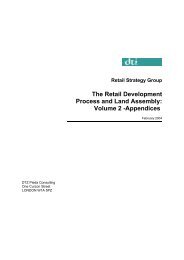Public Policy: Using Market-Based Approaches - Department for ...
Public Policy: Using Market-Based Approaches - Department for ...
Public Policy: Using Market-Based Approaches - Department for ...
Create successful ePaper yourself
Turn your PDF publications into a flip-book with our unique Google optimized e-Paper software.
<strong>Public</strong> <strong>Policy</strong>: <strong>Using</strong> <strong>Market</strong>-<strong>Based</strong> <strong>Approaches</strong><br />
● Benefits of competition among suppliers: introducing competition among<br />
suppliers can lead to lower costs and better quality services. For example,<br />
competitive tendering of UK prison services has led to cost savings of around<br />
10 to 22 per cent. These benefits can arise even when provision of the service<br />
remains in the public sector, provided it is subject to the discipline of<br />
competition. We also found that when competition is introduced in one area,<br />
it can lead to cost savings in other areas where competition has not been<br />
introduced through the transfer of best practice.<br />
In emissions trading, the choice of how emissions are to be reduced is decided<br />
by competition among suppliers, rather than by government decree as in a<br />
conventional administrative scheme. It is estimated that this had led to costs<br />
savings of up to $800 million per year in the US.<br />
● Benefits of greater consumer choice: the ability of firms and individuals to<br />
make choices can lead to a better allocation of goods and services. The use<br />
of choice-based lettings in UK social housing has led to a better allocation of<br />
properties, reducing the time that properties remain vacant by 37 per cent <strong>for</strong><br />
a sample we examined.<br />
<strong>Market</strong>-based mechanisms can also create other benefits such as increasing<br />
transparency and accountability. For example, a tradable permit scheme makes<br />
the cost of reducing emissions more transparent.<br />
Introducing these mechanisms still leaves an important role <strong>for</strong> the state<br />
because market mechanisms will typically need to be designed and managed in<br />
some way. For example, when a competitive tender is introduced, the public<br />
sector still needs to manage the contract with the private-sector supplier.<br />
While market mechanisms can lead to significant benefits, the scale of these<br />
benefits depends crucially on how the mechanism is implemented. We found<br />
that the competitive tendering of prisons has been more successful in the UK<br />
than it has been in the US as a result of differences in implementation. There<br />
may also be a need <strong>for</strong> creative thinking in order to adapt a market mechanism<br />
to the particular public-policy issue being tackled.<br />
In Part II we offer specific lessons <strong>for</strong> the implementation of each mechanism we<br />
have considered. These lessons are drawn in large part from the three case<br />
studies we carried out, which we briefly summarise below.<br />
Case studies<br />
COMPETITIVE TENDERING OF PRISONS<br />
Prison services in England and Wales have been subject to competitive<br />
tendering in one of two ways:<br />
6
















